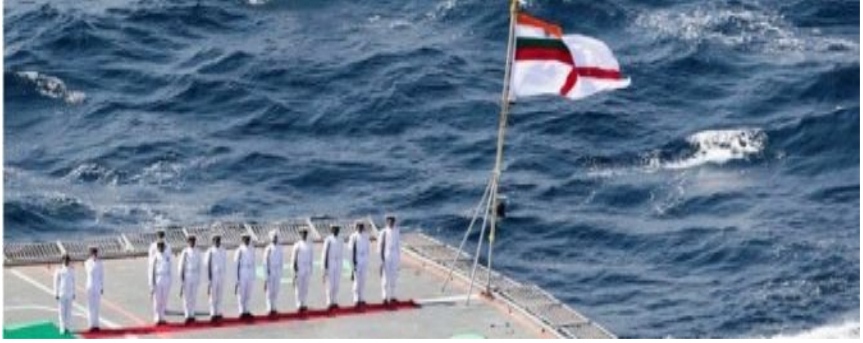Indian Navy’s Operation Sankalp Safeguarding Maritime Trade Routes

The deployment of Indian Naval warships in the Persian Gulf to ensure the safety of Indian Flag Merchant Vessels carrying both import and export cargo after the attack on merchant ships in the Gulf of Oman is a case in point
In the backdrop of the deteriorating security situation in the Gulf region, post attacks on merchant ships in the Gulf of Oman in June 2019, the Indian Navy had commenced Maritime Security Operations, code-named Op SANKALP, in the Gulf Region on 19 June 2019 to ensure safe passage of Indian Flag Vessels transiting through the Strait of Hormuz.
In the trade routes for a merchant ship sailing in an area of high tension, especially under threat of attack, the presence of a warship flying the flag of the same nationality is a highly reassuring sign.
The deployment of Indian Naval warships in the Persian Gulf to ensure the safety of Indian Flag Merchant Vessels carrying both import and export cargo after the attack on merchant ships in the Gulf of Oman is a case in point. These deployments under Operation Sankalp, which commenced on 19 June 2019, are aimed at protecting Indian Flag Merchant Vessels and ensuring their safe passage in the Gulf region and through the Strait of Hormuz.
‘Sankalp’, is a Sanskrit word that means “Commitment” and is in standing with the Indian Navy’s aim to protect India’s shipping and trade, which is clearly reflected as one of the National Maritime Interests espoused in the Indian Navy’s unclassified Strategy Document, “Ensuring Secure Seas: Indian Maritime Security Strategy”.
This article highlights the safeguarding of India’s mercantile marine and maritime trade as an important objective under the military role. Given the complexity of the operation and international environment in which Indian Naval ships are operating, Op-Sankalp is being undertaken with active interaction, and close coordination, with the Ministries of Defence, External Affairs, Shipping, Petroleum and Natural Gas, and the Director-General of Shipping.
West Asia, specifically the Persian Gulf, is an important area for India’s Maritime Trade. In the financial year 2019-2020, around 62 per cent of India’s oil imports valued at approximately 66 Billion USD came from this area. For the same year, India’s exports and imports from the region stood at around 51 Billion USD and 108.2 Billion USD, respectively.
These constitute 8.1 per cent and 11.4 per cent of India’s total exports and imports, respectively. Therefore, Operation Sankalp is a significant Indian Naval endeavour. To date, since June 2019, 20 Indian warships have been deployed and more than 200 Indian Flag Vessels carrying more than 21 Million Tonnes of cargo were provided safe passage.
The deployment is based on the inherent attributes of a blue water navy, specifically reach, versatility and presence, where the operations of a nation’s maritime forces in furtherance of its national interest is representative of national interest and political intent.
In normal times this would have been a “normative” deployment. However, under the shadow of the Covid pandemic, the ability of the Indian Navy to deploy its warships indicates the high level of operational availability and readiness maintained.
This is also indicative of the strict protocols and mechanisms followed by the Indian Navy to mitigate the impact of Covid on its manpower, and hence deployments and operations. As a result, apart from the ongoing anti-piracy patrols and Op-Sankalp, the Indian Navy successfully carried out several deployments and operations. Under Operation Samudra Setu, launched on 05 May 2020, as part of the national effort to repatriate Indian citizens from overseas, 3992 Indian citizens were brought back to India by warships.
Under Mission Sagar, assistance to combat Covid was provided to five IOR island nations (Maldives, Mauritius, Seychelles, Madagascar and Comoros), in response to their request for supporting their ongoing national efforts.
The Indian Navy will, even under adverse conditions, continue to deploy warships to protect and further India’s Maritime Interests, while also meeting its responsibilities and obligations of being the first responder in the maritime domain, and as a preferred security partner for many.




